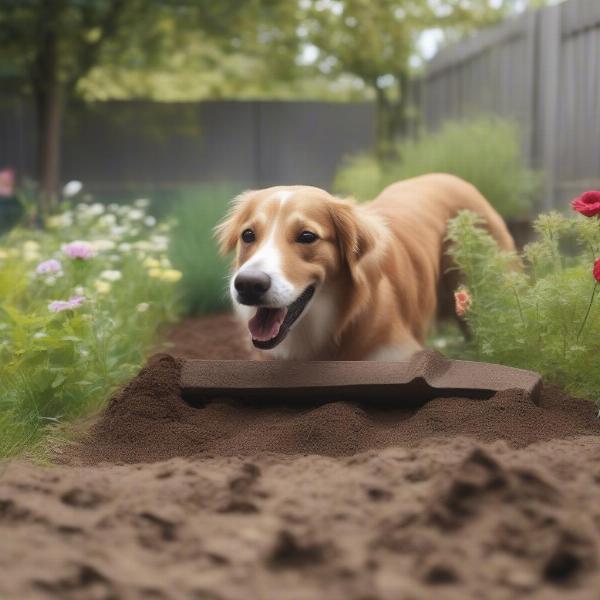No digging dog spray can be a valuable tool in training your dog to stay out of your precious flowerbeds. However, it’s crucial to choose and use these products responsibly. This article delves into everything you need to know about no digging dog sprays, from understanding why dogs dig to choosing the right spray and implementing effective training strategies.
Why Do Dogs Dig?
Understanding why your furry friend enjoys excavating your garden is the first step to addressing the issue. Dogs dig for a variety of reasons, including boredom, buried treasure (toys or bones), hunting instincts, temperature regulation (creating a cool spot in the earth), or even just plain fun! Some breeds, like terriers, are genetically predisposed to digging.
Choosing the Right No Digging Dog Spray
Not all dog sprays are created equal. Look for sprays specifically designed to deter digging, which usually rely on scent-based deterrents rather than harmful chemicals. Avoid sprays containing harsh chemicals, as these can be harmful to your dog, your plants, and the environment. Consider natural ingredients like citrus or citronella, which are often unpleasant to a dog’s sensitive nose.
Training Techniques to Combine with Spray
While no digging dog spray can be helpful, it’s most effective when used in conjunction with training. Positive reinforcement methods, such as rewarding your dog for staying away from your garden, are often more effective than punishment. Here are some training tips:
- Provide Designated Digging Areas: Create a designated digging zone in your yard where your dog is allowed to dig. Fill this area with loose soil and bury toys or treats to encourage digging in the appropriate spot.
- Supervise and Redirect: When you see your dog starting to dig in the forbidden zone, redirect their attention to their designated digging area or to a more acceptable activity, such as playing fetch.
- Be Consistent: Consistency is key to any training program. Apply the spray and redirect your dog every time they dig where they shouldn’t.
 Dog digging in a designated digging area
Dog digging in a designated digging area
Understanding Your Dog’s Behavior
Sometimes, digging can be a sign of underlying anxiety or stress. If your dog is digging excessively, consider consulting with a veterinarian or a certified dog trainer to rule out any medical or behavioral issues. They can help you determine the root cause of the digging and develop a tailored training plan.
Are There Homemade Alternatives?
While commercial no digging dog sprays are readily available, some pet owners prefer homemade solutions. A mixture of diluted citrus peels or vinegar can sometimes deter dogs. However, be sure to test any homemade spray on a small area of your garden first to ensure it doesn’t harm your plants.
Is No Digging Dog Spray Harmful to My Dog?
Reputable no digging dog sprays are designed to be safe for dogs when used as directed. They typically rely on unpleasant scents rather than harmful chemicals to deter digging. However, always read the product label carefully and follow the instructions.
What If the Spray Isn’t Working?
If you’ve tried no digging dog spray and training techniques but your dog continues to dig, it may be time to consider other solutions. Physical barriers, such as fencing or netting, can be effective in preventing access to certain areas of your garden. You might also consider consulting with a professional dog trainer for more personalized advice.
Conclusion
No digging dog spray can be a useful tool in your arsenal when tackling unwanted digging behavior. However, it’s essential to remember that it’s most effective when used alongside consistent training and a thorough understanding of your dog’s motivation for digging. By combining these approaches, you can protect your garden and maintain a harmonious relationship with your furry friend.
FAQ
- Is no digging dog spray safe for puppies? Always check the product label for age recommendations. Some sprays may not be suitable for very young puppies.
- How often should I apply the spray? Reapply the spray as needed, especially after rain or watering.
- Will the spray harm my plants? Choose sprays specifically designed for use around plants. Always test the spray on a small, inconspicuous area first.
- Can I make my own no digging dog spray? Yes, diluted citrus peels or vinegar can sometimes be effective.
- What if my dog continues to dig despite using the spray? Consider other solutions like physical barriers or consult with a professional dog trainer.
- Are there any breeds that are more prone to digging? Yes, terriers and some hounds are known for their digging instincts.
- Can digging be a sign of a medical problem? In some cases, excessive digging can indicate an underlying medical or behavioral issue. Consult with a vet if you’re concerned.
About ILM Dog
ILM Dog (https://ilmdog.com) is your global resource for expert dog care advice and information. We cover all aspects of dog ownership, from breed selection and puppy care to senior dog health and training. Our mission is to provide practical, reliable guidance to help you nurture a happy, healthy relationship with your canine companion. We offer expertise in Dog Breeds and Selection, Training and Behavior, and Products and Accessories to help you find the perfect fit for your furry friend. For personalized advice or to explore our services further, contact us at [email protected] or call us at +44 20-3965-8624.